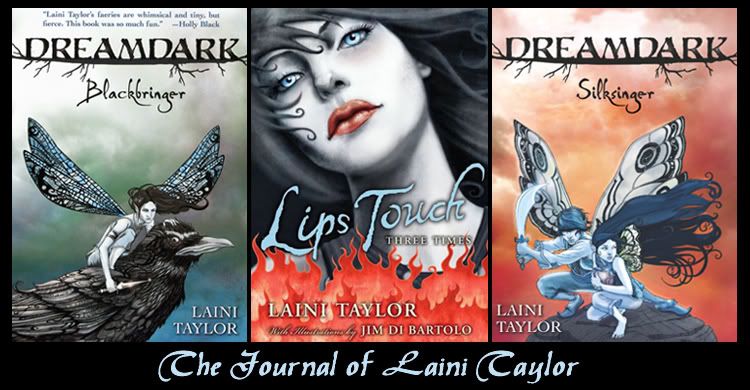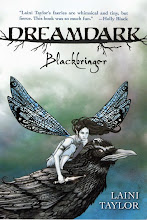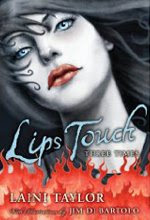I know, I shouldn't be here right now. I should be frantically revising, but I couldn't stay away. Why? Wellllll. . . I got a draggy email today that sort of derailed my deep, happy concentration. And it has been deep and happy and everything has been going great, truly, the book is at last becoming the book I have always wanted it to be. Yay! But since the suck email, I've been trying and trying to scoop my brain back into the world of Dreamdark, but I have not yet been successful, so here I am instead, because writing about writing often gets me inspired, and here is a post I have been wanting to write.
So check this out. I got the greatest email from a 13-year-old named Jessica (dig her playful spelling at the end) and I was pretty floored by how perfectly and succinctly she summarizes the trials and woes of writing a novel. I think you will agree:
Dear Laini,
Do you ever get so incredibly frustrated when writing through drafts of your book that you just want to erase it all and start all over? That's how I feel right now! I've been writing and re-writing this one chapter and now I'm so fed up with it I'm ready to bang my head against the computer desk! Suddenly it seems like the story doesn't want to work with me and I just can't get the words to flow the way I want to. Out of the blue, I'm stuck on how to describe things and how to give my readers the opportunity to make connections with what's happening. Whatever inspired me to write this book seems to have faded away and I can't get it back. Is that normal for a young author? Is there some sort of cure for my sudden lack of inspiration? Please give me any advice you might have. Thanks.
Sincerely,
Jehsyka
Wow. Jessica, you're awesome, and you will so write novels, of that I have no doubt. (By the way, I have been lucky enough to read a plot summary of Jessica's fantasy novel and it is awesome and I've jokingly doubted that she could really be 13 -- but, Jessica. . . are you really???)
Okay. YES, Jessica, I do get so incredibly frustrated that I want to erase it all and start over, and I do erase it all and start over -- which I don't necessarily advise, but sometimes it is the only solution. (But not always.)
The first goal is to find the story. This doesn't always happen on the first try, and really, when you think about it, it would be kind of like a crazy coincidence if it did. I mean, a young story is a wild and feral thing that has never seen a human before. It's not curled up in your lap like a cat. It takes some hunting to find it.
The trick is to keep hunting. Keep writing. And specifically, keep writing that story. Yes, new ideas will spring to your mind that seem so shiny and gorgeous and, by comparison, easy. Resist them. They are like those evil lake spirits that look like beautiful maidens just to lure you close, and as soon as they've got you in their clutches, they turn into hags and drown you! That is to say, even the new ideas will get hard once you get going on them. Don't let them trick you into abandoning your work-in-progress.
You need to develop a habit of completion. For a new writer, it might be a good idea to start on stories or novellas, rather than novels, because dang, novels can defeat almost anybody. But the most important thing is to heed the story that is alive in you, whatever it is, and whatever it wants to be.
And NO, it will not always feel alive in you. What inspired you to write the book is bound to fade away as you work with it day in, day out. This is totally normal. You must make yourself remember how it made you feel in the beginning, and remind yourself always of what you loved about it when it was all fresh and shimmery. I recently discovered that a writer friend does something I also do, which is make a list of the things I love about my book, so that when I am having a hard time accessing the love, I can refer to it and just trust that, at one time, those ideas did seem shiny and original and awesome -- and that when someone reads them for the first time they will think so too. The ideas for Silksinger that I have now been laboring with for over a year, for example. They stopped being fun new ideas so long ago. But I have a page in one of my notebooks entitled "COOL THINGS" and it's a list with things on it like: dragonfly caravans, Djinn in bottles, trapdoors, licorice-whip eyes, and crickets dancing to a zither, along with various secret identities, crushes, and nemeses that are crucial to the plot.
There's a lot of faith involved, faith in your original idea, and there's a lot of stubborness involved too, to stick with it and finish it. Here's a question: what's the main difference between a published novel and one that is sitting unfinished in a drawer? Well, the main difference is that the published one is finished. "Finished" is an absolute prerequisite to publication. Even before the requirement that it be good, first it must be finished -- because only then can you go on and make it better (but making it better, that is, revisions is another subject for another day).
When you feel uninspired, it is your task to re-inspire yourself, not with a new idea altogether, but perhaps a new idea within your idea, or a whole new way of looking at your idea. Sometimes I think of this as "turning the kaleidoscope." If a scene or section of the book feels dull and colorless, I try to turn the kaleidscope, get the colors wheeling and spinning, look at the events of the story from every conceivable angle and figure out a cooler way of unfolding them. Or, if this completely fails, sometimes I might have to face the hard fact that I've taken a wrong turn in the labyrinth of my novel, and I have to go back a few paces and try another path. There is always a way through. You just haven't found it yet.
Remember: as long as you keep working, the book can never defeat you. It might feel like it is fighting you, but really its only tactic is intimidation. It can't do anything to you, but you can do everything to it. You are its god, and it must obey you, not the other way around!
As for the actual work of laying down words and creating scenes, this is another place where sheer stubborness comes in. You must simply do it and keep doing it. I love the way you phrased this: "how to give my readers the opportunity to make connections with what's happening." I think that's a gorgeous of way of saying what it is we're trying to do. All I can really say is that I try to sort of "climb inside" the scene and feel as if it is really happening, and examine the way the characters would truly feel. How would you feel? If you can get at the truth of the emotion, you might be able to make that connection. Then, of course, you must be able to clothe that truth in language that enables it to be transferred to other human brains, and that is a matter of practice and work, and developing mastery of language.
One thing I will tell you about being stuck on one chapter is this: skip it. Or rather, take an index card or a scrap piece of paper (something that is not precious) and just write a simple synopsis of what needs to happen in that chapter, both the actual happenings and the emotional growth of the character. Write it as simply as you can. Get to the bone of it. Then just set that aside and move on to the next chapter. I find so often that it is easier to go back. It's as if, by simply skipping it, I've showed it who's really in charge and next time it behave much better.
Along the lines of that sneaky index card or scrap piece of paper, here's another thing to try: never don't write. I mean, when you're stuck, don't just stare at your chapter. Instead, open up a writing journal or a new document on your computer and "chat with yourself" about what you're trying to do. Write about the scene, about the plot, about whatever is tripping you up. Brainstorm, turn the kaleidscope, ask "What if. . .?" about a million times. Try out scenarios. Very very often, this turns into writing.
All in all, in my experience (today included), there is much woe and turmoil in the writing of a novel. Sometimes one must embrace the joy of woe, that is -- slunch down on the sofa and watch a crappy movie instead of writing, all while complaining about how hard writing is. This can be very satisfying. (I know.) Well, woe is so much easier than writing, but, while satisfying in the now, it does not really pay off in the long run. (I know that too. If I could be 13 again, I'd do things differently!)
I could go on about this stuff forever, but I will finish up with this quote that I found today in an interview with the writer Larry Doyle (who wrote for The Simpsons and also wrote the novel I Love You Beth Cooper, which is very funny but not at all appropriate for a 13-year-old!!):
"I have always wanted to write a novel. What prevented me from doing so until now is there was nothing stopping me from not writing it."
- Larry Doyle
Thank you for your great emails, Jessica! I hope this helps a little. Keep writing. (And P.S. It is okay at 13 to write stories instead of a novel, and work your way up, but that is entirely up to you.)
Subscribe to:
Post Comments (Atom)









11 comments:
I always read your blog, and i've never left a comment before. But i really loved this blog, so i wanted to say thank you.
I'm fifteen and have always wanted to be a writer, but i can't ever finish anything. I get ideas for stories constantly, and i always start one and get bored and so i start another one and, AAWWW!
This blog inspired me to finish something. Thanks!
Chelsea
Hi Chelsea! Thanks for commenting -- finishing things is the hardest part, I think, but so important. Even finishing short pieces is a great training exercise for finishing longer ones. The sense of accomplishment is AMAZING and makes all the hard work worth it!
Yes, I'm actually 13! ^_^
Osh Kosh B'gosh, Laini. Well, I definately am treasuring this post as my favourite so far in your blog. Thanks for the mentioning!
Laini, where were you when I was 13?? I could have used sage and practical advice like this then. I love it when you write about writing -- and your advice is always applicable to other things in life, I think.
"Turning the kaleidoscope." I LOVE that. Yes, yes, yes! And this:
"It can't do anything to you, but you can do everything to it."
I'm hanging that above my desk. It's so easy for me to forget who is the boss of whom!
Another fabulous post. I'm sorry a bad email helped inspire it, but I'm PROUD of you for staying away from the sofa & those tempting crappy movies. That takes GUTS. You're gonna kick Silksinger's tuchis! GO LAINI!!
You're welcome, Jessica! And thanks again for the great question.
Lilie: where was I when I was 13, too. I didn't figure any of this stuff out until my 30s! Sigh.
Stephanie: thank you! Hope YOUR writing is going well!
I love your blog. I think you're great, taking time from your revision to answer a frustrated writer's e-mail. Jessica is definitely a writer!
Laini!
Where were you when I was thirteen? Wait... that was only a year ago, so I guess that's okay. No, realy what I want to say is THANK YOU! I, too, have read your blog constantly ever since i was fortunate to read about Blackbringer on Shannon Hale's blog... you're advice is wonderful, and an answer to a very discouraged, distressed prayer. I'll definitely stick to your advice, for I have now realized where I went wrong. :) Thanks again! You are an inspiration to any person lucky enough to read any of your writing, whether it is your specatcular book or your fun blogs.
*Lainey*
Wow! That's all I can say. Wow. I needed to read this today.
Can I please hire you to be my personal assistant/ writing coach/ muse/ mentor/ teacher/ live-in writer BFF? Just asking.
Thanks for this!
Hope to see you soon.
Eve
Laini Thank you so much! what a great post from the newly dubbed "Wizard of Oz."
So here it is. eek day eve. are you celebrating yet?
Post a Comment